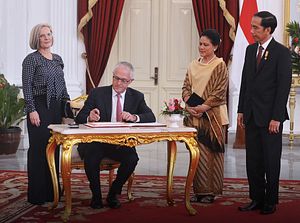Prior to Indonesian President Joko “Jokowi” Widodo’s maiden visit to Australia on February 25-26, The Australian – a conservative-leaning paper in Australia – published its exclusive interview with Jokowi on February 24. Jokowi was reported as saying that he was open to the possibility of joint Indonesian-Australian patrols in the South China Sea, provided such an arrangement would not further inflame tensions. Although not specifying China by name in the interview, Jokowi almost certainly had China in mind as regards keeping a lid on any intensification of the conflict in the South China Sea.
It quickly became apparent that while Canberra was far more inclined to talk about bilateral security cooperation during Jokowi’s visit, Jakarta did not view this matter as a priority, particularly with regard to the South China Sea. Indonesia prefers not to antagonize China, as Jakarta’s main priority is preserving the sovereignty of the waters in and around the Natuna Islands. Furthermore, the political elites in Jakarta appreciate the value of deepening economic engagement in Sino-Indonesian relations.
About a month before Jokowi’s Australia visit, General Gatot Nurmantyo, the Indonesian military chief, suspended Indonesian-Australian military cooperation in January 2017 when offensive materials about Indonesia were found at a military training center in Perth. Despite Gatot accepting an apology from Australia’s army chief, bilateral military ties were not fully restored until after Jokowi’s visit.
This kerfuffle suggests that there exists a trust deficit in military cooperation between the two countries. Add to that the deep-seated resentment in the historical memory of not just the Indonesian military, but Indonesians generally, of Australia’s support for Timor-Leste’s independence, and the lingering fear that the same could happen with West Papua. Taken together, this bilateral trust deficit renders any semblance of joint patrolling in the South China Sea a distant prospect as far as Indonesia is concerned.
So even when Defense Minister Ryamizard Ryacudu first broached the idea of a joint patrol in the South China Sea in 2015 and again in 2016, when he mooted the same to Australia’s Foreign Minister Julie Bishop and Defense Minister Marise Payne, he was criticized by the Indonesian military, especially Gatot. Not only did Ryacudu’s idea not gain any domestic traction in Indonesia, but it was also met with caution in Australia as perhaps it was felt he was actually not speaking on behalf of Jokowi’s government.
It is quite noticeable that there exists a perception gap between Jakarta and Canberra. On the one hand, Canberra’s primary concern relates to strategic and security issues, especially with regard to the South China Sea, not least because of its paramount importance to Australian shipping and trade. On the other hand, Jakarta is far more concerned with economic benefits, derived in considerable part from foreign trade and investment.
This primacy of economics is attributed to Jokowi himself, who is popularly seen as a pragmatic leader committed to promoting infrastructural development in Indonesia. Jokowi is not described as a foreign policy president and therefore he is often rather uncomfortable to deliberate on matters related to security, including on maritime issues as pertains to the South China Sea. If anything, Jokowi is more an economic diplomacy president where foreign policy advances the country’s economic national interest.
During the joint press conference between Jokowi and Turnbull, it came as no surprise that the issue of joint-patrolling the South China Sea was not raised. Based on a report of that conference by Kompas, a mainstream Indonesian newspaper, a glimpse was provided into the Indonesian perspective of Jokowi’s maiden visit to Australia.
While Turnbull noted that “President Widodo and I agreed to fully restore cooperation in defence, training activities and [military] exchange,” Jokowi spoke instead about a free trade deal to be signed by Indonesia and Australia later in the year. He is likely to be referring to the Comprehensive Economic Partnership Agreement, which, while initiated a decade ago, was only revitalized in 2016 under a Jokowi presidency. Further underscoring the economic imperative, Jokowi articulated: “I have discussed several key issues with Prime Minister Turnbull. Most importantly is to remove both the tariff and non-tariff obstacles in trade for Indonesian products such as paper and palm oil.”
Glancing at the composition of Jokowi’s delegation to Australia, one can immediately discern that the visit had a clear economic purpose. Included in the entourage were Foreign Minister Retno Marsudi, Coordinating Minister for Economic Affairs Darmin Nasution, Trade Minister Enggartiasto Lukita, Head of the Creative Economy Agency Triawan Munaf, and Chairman of the Investment Coordinating Board Thomas Lembong.
That Defense Minister Ryamizard Ryacudu, Coordinating Minister for Political, Legal and Security Affairs Wiranto, and Coordinating Minister for Maritime Affairs Luhut Pandjaitan were absent from Jokowi’s delegation further testifies that economic, rather than security, cooperation was at the top of Jokowi’s agenda in Australia.
Pursuant to the economic theme, it was unsurprising that Jokowi made use of his Australia trip to meet up with the Indonesian diaspora – many of whom were students in Australia – and implore them to return home and contribute to the local economy.
Clearly, Jokowi’s visit to Australia was premised on enhancing economic cooperation, not least because, despite their geographical proximity, the two-way trade of around A$15 billion did not rank Indonesia as among Australia’s top ten trading partners. In contrast, Turnbull envisaged a bilateral relationship beyond the economic imperative. This mismatch in expectations underpinned Jokowi’s maiden visit to Australia.
But the fact that there were positive atmospherics between Jokowi and Turnbull as reflected by their meet-up being more of a casual affair suggests that there is cautious optimism for enhanced economic cooperation as a mutual starting point for a more holistic bilateral relationship in the longer term. Focusing more on the economic than security cooperation in Australia-Indonesia ties may be more acceptable domestically in Indonesia where public opinion is increasingly being defined by nationalistic fervency.
Professor Leo Suryadinata is visiting senior fellow and Dr Mustafa Izzuddin is fellow at the ISEAS-Yusof Ishak Institute.

































